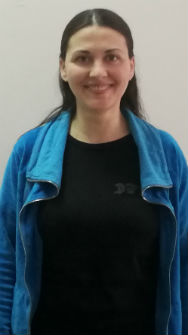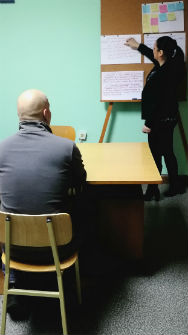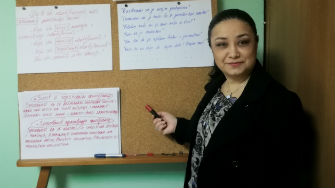Enhancing human rights protection for detained and sentenced persons in Serbia
I'm changing my way of thinking because I want to change myself
"The most important thing is not to get out of here with the same way of thinking and not to repeat a mistake and then have to come back here. I feel like I am maturing, even now I'm thinking and reacting differently," says Dragana Bogdanovic from the Women's prison Pozarevac. She is one of the 11 sentenced persons who participate in general behavioural programme workshops, which involve changing patterns of criminal behaviour. 
Dragana has the freedom to talk about how she feels and what she thinks in the workshops and she perceives that they are provided the support for change she needs. "It is very important to recognise our own mistakes and to change them. I want to have a normal life and establish a good relationship with my family when I get out. I am honoured to have the opportunity to look at my mistakes from another angle," she says.
These workshops in prisons were organised within the action "Enhancing human rights protection for detained and sentenced persons" in the framework of the Joint Programme of the European Union and the Council of Europe "Horizontal Facility for Western Balkans and Turkey”. The project is implemented by the Council of Europe in co-operation with four relevant ministries in Serbia. The general behavioural programme is one of the programmes being run in Serbian prisons.
"They develop communication skills, how to regulate and control emotions, they learn how to control their anger and exercise conflict resolution. It is important for them to develop life skills and plan their future life," says Ivana Cvetanovic, a psychologist in the female prison in Pozarevac.
The aim of the programme, which was developed by representatives of three institutions in Serbia, the prison Zabela Pozarevac, the Juvenile Correctional Facility in Krusevac and the Penitentiary for Women Pozarevac, is to change of the ways of thinking, opinions and behaviours that led them to prison. "The essence is that the way of thinking influences behaviour and feelings. Participants are most interested in the practical exercises," says Ivana Cvetanovic.

The inmates from Zabela prison, who decided to "work on themselves" have similiar reflections, "A will to see my mistakes so I would not repeat them has motivated me. I already see a change, I have consolidated my boundaries, I am quite calm and now I know what I want and how I want it," says Gerim Ibrovic from Zabela. He acknowledges that the indulgence of personal boundaries has led him to prison, but now he is managing to change it. "I learned which emotions originate from wrong thinking and how I can control them, now I am less nervous," says Gerim.
Gerim, along with eight other prisoners, loves the creative workshops where they participate in a role play about a criminal situation. "There is rarely an opportunity to be creative here, so this has now given us the freedom to make practical workshops through which they will get to know themselves better," says Dijana Dimovska, a psychologist who runs workshops at Zabela. She says that the convicts sometimes feel very emotional about what they see "on the stage" because it brings back memories of their "early works" that brought them to jail.
Group work is not a novelty in prisons, but what is new is that now in all three institutes the same programme is implemented in a systematic way in all three institutions. "I noticed that they influence each other, and there are already some obvious changes in their behaviour," says Dimovska. 
This project is funded by the European Union and the Council of Europe and it provides support to the Serbian authorities in ensuring the implementation of the key European standards and helps further progress in the European integration process.

